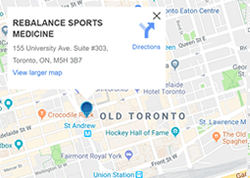Total Knee Replacements…Is it Always the Answer?
 When suffering from debilitating knee pain that limits your function and quality of life a total knee replacement may seem like the solution. This surgical procedure involves replacing the painful joint with a prosthetic joint, which gives hope for improved mobility, strength and decreased pain. Total knee arthroplasty (TKA) also known as “total knee replacements” are becoming more popular as a successful, cost-effective measure to improve function for individuals with significant knee arthritis. In the US 600,000 surgeries were performed in 2012 compared to 250,000 15 years ago.
When suffering from debilitating knee pain that limits your function and quality of life a total knee replacement may seem like the solution. This surgical procedure involves replacing the painful joint with a prosthetic joint, which gives hope for improved mobility, strength and decreased pain. Total knee arthroplasty (TKA) also known as “total knee replacements” are becoming more popular as a successful, cost-effective measure to improve function for individuals with significant knee arthritis. In the US 600,000 surgeries were performed in 2012 compared to 250,000 15 years ago.
The decision as to whether a patient is an appropriate candidate for a TKA is multifaceted, and is unique to each individual. A person’s mental health, co-morbidities and body mass index are taken into account along with their X-ray results and the severity of their condition. Patients with fewer co-morbidities and affected joints, higher pre-operative function and a non-inflammatory arthritis are most likely to do well after a TKA. Patients who are non-responsive to conservative measures and have advanced arthritis characterized by severe pain and functional disability (i.e. difficulty climbing stairs, getting in and out of a chair or walking independently) are deemed most appropriate for a TKA.
Pain is one of the most important factors influencing the recommendation for total joint replacement,. The goal for many patients undergoing this surgery is to reduce their pain and improve their functional status. However, recent evidence indicated that up to 20% of total knee replacement patients were experiencing “unfavourable pain” up to 5 years post-surgery. Unfavourable pain was defined as lack of improvement in pain scores, pain at rest, persistent pain and night pain. Patients considering undergoing a total knee replacement should be aware of the potential risks following surgery and that their prognosis can vary.
 If you and your surgeon determine that a total knee replacement is right for you, a physiotherapist can help to optimize your surgical outcomes and assist in the management of pain after your surgery. Studies show that quadriceps muscle strength can significantly affect your functional outcomes after TKA and as such it is important that you are able to strengthen this muscle group effectively after your surgery-a physiotherapist can help you achieve this safely! A physiotherapist will also help you attain full range of motion of the knee, strengthen other supporting musculature and work with you to improve your endurance, balance and normalize your gait.
If you and your surgeon determine that a total knee replacement is right for you, a physiotherapist can help to optimize your surgical outcomes and assist in the management of pain after your surgery. Studies show that quadriceps muscle strength can significantly affect your functional outcomes after TKA and as such it is important that you are able to strengthen this muscle group effectively after your surgery-a physiotherapist can help you achieve this safely! A physiotherapist will also help you attain full range of motion of the knee, strengthen other supporting musculature and work with you to improve your endurance, balance and normalize your gait.
If you have recently had a total knee replacement and would like us to help you improve your outcomes, book in with one of our skilled and knowledgeable physiotherapists today!
Rebalance Toronto
Rebalance Sports Medicine is a multidisciplinary clinic in downtown Toronto offering physiotherapy, chiropractic, registered massage therapy, sports medicine, naturopathy, Pilates and more.



 What to Expect From Your First Physiotherapy Visit
What to Expect From Your First Physiotherapy Visit The Benefits of Fascial Stretch Therapy [Demo]
The Benefits of Fascial Stretch Therapy [Demo] How Does Physiotherapy Work?
How Does Physiotherapy Work? Best Exercises for Low Back Pain
Best Exercises for Low Back Pain